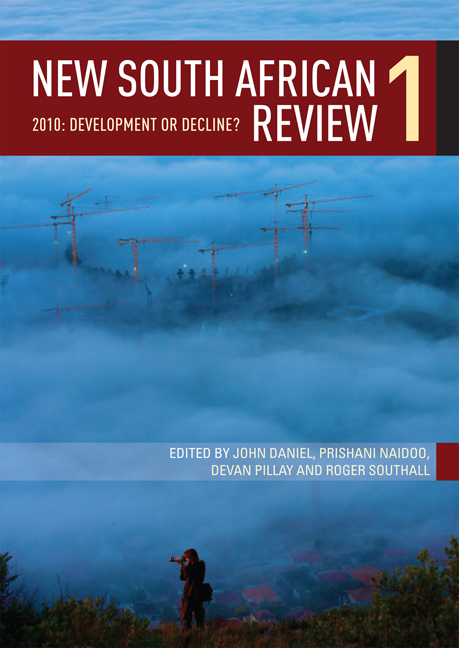Book contents
- Frontmatter
- Contents
- Preface
- Introduction South Africa 2010: From short-term success to long-term decline?
- PART 1 ECONOMY, ECOLOGY AND SUSTAINABILITY
- PART 2 STATE, POLITICS AND POLICY
- PART 3 EDUCATION, HEALTH AND LAND
- PART 4 Doreen Atkinson
- INTRODUCTION Signs of social decline? Crime, prisons, child trafficking and transactional sex
- CHAPTER 17 Our burden of pain: Murder and the major forms of violence in South Africa
- CHAPTER 18 Waiting for Godot: Awaiting trial detainees in South Africa
- CHAPTER 19 Wolves in sheep's skin: Trafficking of children in Musina, Limpopo Province
- CHAPTER 20 Relationships of exchange amongst South African youth in an age of conspicuous consumption
- Contributors
- Index
INTRODUCTION - Signs of social decline? Crime, prisons, child trafficking and transactional sex
from PART 4 - Doreen Atkinson
Published online by Cambridge University Press: 21 April 2018
- Frontmatter
- Contents
- Preface
- Introduction South Africa 2010: From short-term success to long-term decline?
- PART 1 ECONOMY, ECOLOGY AND SUSTAINABILITY
- PART 2 STATE, POLITICS AND POLICY
- PART 3 EDUCATION, HEALTH AND LAND
- PART 4 Doreen Atkinson
- INTRODUCTION Signs of social decline? Crime, prisons, child trafficking and transactional sex
- CHAPTER 17 Our burden of pain: Murder and the major forms of violence in South Africa
- CHAPTER 18 Waiting for Godot: Awaiting trial detainees in South Africa
- CHAPTER 19 Wolves in sheep's skin: Trafficking of children in Musina, Limpopo Province
- CHAPTER 20 Relationships of exchange amongst South African youth in an age of conspicuous consumption
- Contributors
- Index
Summary
When all the balance sheets are tallied and the sums done, it is still the nature and quality of the everyday lived experiences and interpersonal relationships, in particular of the most vulnerab le, that speak to the character of a society. This section presents a glimpse into the fractured and fragile nature of a society trying to grapple with the entrenched divisions and inequalities left by apartheid in a context in which first-world, consumerist aspirations, values and standards are becoming the norm. The character of the South African transition and post-apartheid society has been shaped both by the ways in which apartheid influenced (and continues to influence) the nature of social relations and experiences of the everyday, as well as by the demands (made on people and institutions) of re-entry into a global economy and society in which neoliberal principles and values have gained dominance. This is reflected in various ways in this section, from a sobering account of the continuing occurrence of violent crime (Bruce), to the deplorable conditions of awaiting trial prisoners and the broader problems of the South African criminal justice system (Gordin), to the largely uncharted terrain of child trafficking across the Zimbabwe-South Africa border (Kropiwnicki), and an exploration of the ways in which young men and women in an urban South African township relate to each other in the form of ‘transactions’ (Selikow and Gibbon).
Beginning with an overview of violent crime, David Bruce provides us with evidence that a culture of violence continues to define everyday life in South Africa. Bruce cites official statistics of over 328 000 murders (homicides), over 750 000 incidents of rape, close to 1.6 million incidents of aggravated robbery, and 3.6 million incidents of assault with intent to inflict grievous bodily harm as having occurred since 1994. Disaggregating national crime statistics from various sources according to race, gender and age, Bruce shows several continuities in racialised trends consistent with apartheid, and points to other significant differences with regard to gender and age.
- Type
- Chapter
- Information
- New South African Review2010: Development or Decline?, pp. 384 - 388Publisher: Wits University PressPrint publication year: 2010



